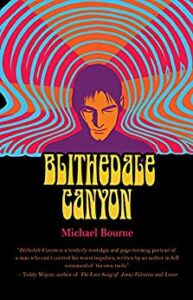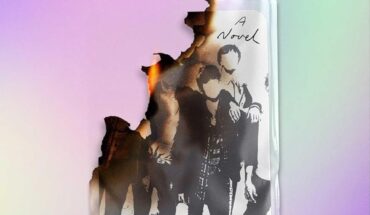 Michael Bourne’s debut novel Blithedale Canyon, just dropped and our very own Rachel Barenbaum had a chance to chat with him about the novel, writing, and what he hopes readers will take away. Here we go…
Michael Bourne’s debut novel Blithedale Canyon, just dropped and our very own Rachel Barenbaum had a chance to chat with him about the novel, writing, and what he hopes readers will take away. Here we go…
Michael, congratulations on the publication of your debut novel, Blithedale Canyon. Tell us, What is your book about?
Thanks, and thanks for inviting me to contribute. Blithedale Canyon is a story of love and other addictions set in a small Northern California town rapidly shifting from hippie haven to moneyed paradise. The novel’s narrator, Trent Wolfer, who is battling addictions to drugs and alcohol, moves back to his hometown after he narrowly avoids serious jail time for defrauding the owner of a liquor store where he used to work. Not long after he returns home, he meets a woman he grew up with and the book is about his struggle to pull his life together before he blows up hers.
There are some weighty subjects in this novel. You cover addiction, rehab and love. Why did you dig into these themes? And was it hard to write about them?
Short answer: I wrote a book I would want to read. I have the attention span of a gnat and I get bored with books unless the characters are in deep trouble. So I started the book with Trent in deep trouble. He’s on probation for a serious crime, he’s friendless and broke, he can’t stop using drugs and alcohol, and he’s done the single most destructive thing a person in his situation can do, which is to fall in love. So now what does he do? Deep down, he’s a decent guy. He doesn’t want to hurt the people he loves, but he knows he keeps doing it. It was a pleasure to write the book because I always wanted to know what Trent would do next.
I didn’t find it difficult to write about these subjects. Blithedale Canyon is fiction, not memoir, but I know the world Trent inhabits – both mentally and geographically – all too well. And I made sure to bring the funny whenever I could. Trent is one of those guys who bullshits everybody he meets so he’s hyper-attuned to other people’s bullshit. The novel is set in Mill Valley, California, an uber-wealthy, peak woo-woo suburb of San Francisco, so there was never a shortage of material to work with.
What part of the novel was the most fun to write? What did you enjoy the most?
I’d have to say the last chapter. It took me a long time to figure out how I wanted to end the book, but once I knew, the pieces fell into place and I wrote the first draft of the last chapter in one sitting. That’s the greatest feeling in the world, when you know what has to happen and, line after line, scene after scene, the words arrive just as you need them.
What do you hope readers will take away from your book?
More than anything, I want readers to enjoy the experience of reading the book. If a novel isn’t a pleasure to read, then none of the rest really matters, does it? But if there’s a take-away from Blithedale Canyon, it’s that you have to separate the addict from the addiction. Trent is a good guy who does bad things. That doesn’t excuse the bad things he does, and I tried to be very clear on the consequences of his actions on his loved ones, but I hope readers can grant Trent his humanity apart from the substances that he uses.
You have been a writer and around writers for many years. What surprised you about writing this book? What did you learn about publishing that you never knew until you were deep into your debut?
This isn’t a publishing thing, but it’s surprised me how many people connect personally to Trent’s story. When I was passing the book around to writer friends looking for advice on revisions, my friends would make their comments and then they’d tack on a note at the end saying, “P.S. I used to date a guy just like Trent” or “My family is dealing with this right now.” And now that the book is starting to find its way into the world, I’m getting the same thing, little notes that indicate how deeply personal this issue is for a lot of people. It’s gratifying, obviously, because that’s part of the reason I wrote the book, but I’ve been struck by how hard it is for people to talk about addiction. There’s the pop cultural “Celebrity Rehab” version of it, and everybody has opinion about that, but the messy reality of it showing up in your own life is hard for people to wrap their minds around, I think.
What advice do you have for new writers?
Get good at failing. I took so much longer than I could have to figure out how to write a good book because I didn’t learn from my early mistakes. I saw all those terrible stories I wrote in the beginning as evidence that I didn’t have it, that I wasn’t really a writer, and so – using the powers of magical thinking – I told myself they weren’t really failures. Other people just didn’t understand how great my stories were, I was misunderstood, etc., etc.
I don’t think I’m alone in this, honestly. As a culture, we’re terrified of failure. It carries this weirdly moral taint, like, if you can’t succeed, there’s something wrong with you as a person. But if you never let yourself fail, you do what I did a lot of, which is write safe, dull stories that take no artistic risks. You have to be willing to fail and to learn from your failures. That’s the only way you’ll get anywhere, in my experience.
Michael Bourne is a contributing editor at Poets & Writers Magazine and a staff writer for The Millions. He has written for The New York Times, The Economist, Literary Hub and Salon, and his fiction has appeared in more than a dozen literary magazines including december, The Southampton Review, and Tin House. Raised in Northern California, he now lives in Vancouver, Canada, with his wife and son. Blithedale Canyon is his first novel. Find out more at www.



